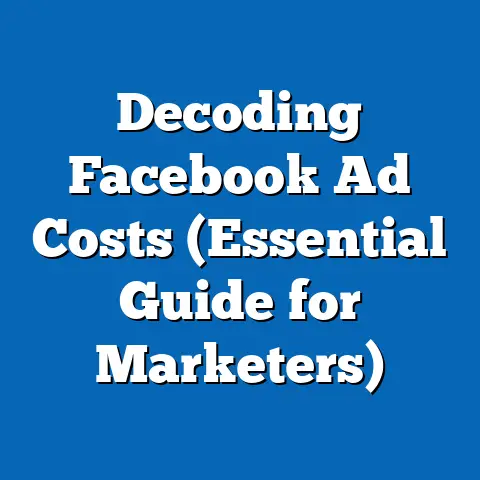Should You Delete Negative Comments on Facebook Ads? (Expert Insights)
In the digital age, where social media platforms like Facebook serve as both marketing battlegrounds and public forums, the way businesses handle criticism can leave a lasting impression on their audience.
Facebook ads, a cornerstone of modern digital marketing, often attract a spectrum of feedback—from glowing endorsements to scathing critiques.
How a brand responds to or manages negative comments can define its reputation, influence consumer trust, and shape its long-term relationship with its audience.
The decision to delete negative comments is not merely a tactical choice; it reflects broader societal trends in communication, transparency, and accountability.
Historically, businesses operated with more control over their public image, often curating feedback through traditional media channels.
However, the rise of social media in the early 2000s—particularly platforms like Facebook, launched in 2004—ushered in an era of unprecedented consumer empowerment, where opinions are shared instantly and publicly, often beyond a company’s control.
The Evolution of Public Feedback in the Digital Age
To understand the stakes of managing negative comments on Facebook ads, it’s essential to contextualize the evolution of public feedback.
In the pre-digital era, customer complaints were often confined to private channels—letters, phone calls, or in-person interactions.
Businesses could address these issues discreetly, with little risk of widespread reputational damage.
The advent of the internet, and later social media, fundamentally altered this dynamic.
By 2010, Facebook had grown to over 500 million active users, becoming a primary platform for both personal expression and brand promotion.
The introduction of Facebook ads in 2007 allowed businesses to target audiences with precision, but it also opened the door to direct, public feedback through comments and reactions.
This shift coincided with a generational change in consumer behavior, particularly among Millennials (born 1981–1996) and Gen Z (born 1997–2012), who grew up with social media as a central part of their lives.
These generations value authenticity and are quick to call out perceived inauthenticity or corporate missteps online.
A 2021 study by Sprout Social found that 59% of consumers expect brands to respond to negative feedback on social media within 24 hours, highlighting the demand for immediate engagement over avoidance.
The Case for Deleting Negative Comments
At first glance, deleting negative comments on Facebook ads might seem like a straightforward way to protect a brand’s image.
Negative feedback can deter potential customers, especially in the context of paid advertisements where first impressions are critical.
A 2019 survey by BrightLocal revealed that 82% of consumers read online reviews before making a purchase decision, and negative comments on an ad can shape perceptions of a brand’s reliability or quality.
Some experts argue that deleting comments is a legitimate strategy for maintaining a positive narrative, particularly in cases of trolling, harassment, or irrelevant criticism.
Digital marketing strategist Sarah Thompson notes, “If a comment is abusive or off-topic, it can derail the conversation and alienate other users.
Deleting such comments is less about censorship and more about curating a constructive dialogue.” This perspective emphasizes the importance of context—deleting comments that are malicious or spammy may be justified to preserve the integrity of the ad’s messaging.
Moreover, in highly competitive industries, negative comments can be weaponized by competitors or bots to undermine a brand’s credibility.
A 2020 report by CHEQ estimated that fake reviews and comments cost businesses $152 billion annually in lost revenue.
In such scenarios, deleting or moderating harmful content can be seen as a necessary defense mechanism.
The Case Against Deleting Negative Comments
While deleting negative comments may offer short-term relief, many experts caution against it due to the potential for long-term reputational harm.
Social media users are highly attuned to perceived censorship, and deleting comments can backfire by fueling accusations of inauthenticity or evasion.
A 2022 Edelman Trust Barometer report found that 60% of global consumers believe businesses should be transparent about criticism, even if it’s unfavorable.
Marketing consultant David Lee argues, “Deleting negative comments sends a signal that a brand can’t handle criticism.
It’s a missed opportunity to show accountability and build trust.” Lee’s perspective aligns with broader cultural shifts, particularly among younger generations who prioritize brands that engage authentically over those that project an infallible image.
When a negative comment is deleted, it can also escalate the issue, as users may take screenshots or repost their grievances elsewhere, amplifying the criticism.
Furthermore, negative comments often provide valuable feedback that can inform business improvements.
A 2018 study by Harvard Business Review found that businesses that actively respond to criticism on social media see a 20% increase in customer loyalty compared to those that ignore or delete feedback.
This suggests that engagement, rather than suppression, is a more sustainable strategy for maintaining consumer trust.
The Role of Generational Differences in Feedback Perception
Generational dynamics play a significant role in how negative comments are perceived and how businesses should respond.
Baby Boomers (born 1946–1964), who often value traditional customer service channels, may be less likely to leave public criticism on social media, preferring direct communication with a company.
However, when they do engage online, their feedback often carries weight due to their perceived authority and experience.
In contrast, Millennials and Gen Z are more likely to voice dissatisfaction publicly on platforms like Facebook, viewing social media as a legitimate space for accountability.
These generations are also more skeptical of polished corporate messaging, with a 2020 Pew Research Center survey indicating that 64% of Gen Z consumers distrust large corporations.
For these audiences, deleting negative comments can be interpreted as an attempt to hide flaws, further eroding trust.
Generation X (born 1965–1980), often caught between traditional and digital communication norms, may have a more balanced perspective.
They value efficiency and are likely to appreciate a prompt, professional response to criticism rather than its removal.
Understanding these generational nuances is critical for businesses crafting their social media strategies, as a one-size-fits-all approach to comment moderation is unlikely to resonate across diverse demographics.
Technological and Algorithmic Considerations
The decision to delete or retain negative comments is also influenced by the technological underpinnings of platforms like Facebook.
The platform’s algorithm prioritizes engagement—likes, shares, and comments—when determining an ad’s reach.
While negative comments contribute to engagement metrics, they can also signal to the algorithm that the content is controversial, potentially reducing its visibility to a broader audience.
Digital marketing expert Rachel Kim explains, “Facebook’s algorithm doesn’t distinguish between positive and negative engagement.
A flurry of critical comments can boost an ad’s reach initially, but if the sentiment skews too negative, it may harm the ad’s performance over time.” This creates a dilemma for businesses: deleting comments might stabilize the ad’s algorithmic performance, but it risks alienating users who value transparency.
Additionally, Facebook offers tools like comment moderation settings, allowing businesses to hide or filter comments based on specific keywords or user behavior.
These tools provide a middle ground, enabling brands to manage feedback without resorting to outright deletion.
However, over-reliance on automated moderation can lead to errors, such as hiding legitimate criticism, which can frustrate users and damage credibility.
Economic and Competitive Implications
From an economic standpoint, the management of negative comments on Facebook ads has direct implications for a business’s bottom line.
Digital advertising is a significant investment—Statista reported that global spending on social media ads reached $226 billion in 2022, with Facebook accounting for a substantial share.
Negative feedback on ads can undermine this investment by deterring potential customers or escalating into broader public relations crises.
For small businesses or startups with limited marketing budgets, the stakes are even higher.
A single negative comment, if mishandled, can spiral into a viral controversy, as seen in numerous case studies where brands faced backlash for deleting or ignoring criticism.
Conversely, larger corporations with established reputations may have more leeway to delete comments without immediate consequences, though they risk long-term erosion of consumer trust.
Competitively, how a brand handles negative feedback can serve as a differentiator.
Companies that respond thoughtfully to criticism often stand out in crowded markets, as they demonstrate customer-centric values.
A 2021 study by Zendesk found that 75% of consumers are more likely to recommend a brand that handles complaints effectively on social media, underscoring the economic incentive to engage rather than delete.
Cultural and Social Factors Shaping Public Expectations
Culturally, the expectation for transparency in business communication varies widely across regions and societies.
In Western markets like the United States and Europe, where individualism and consumer rights are emphasized, deleting negative comments is often viewed as an attempt to suppress dissent.
Social media users in these regions are quick to call out perceived censorship, as evidenced by viral hashtags like #BrandFail or #Boycott when companies mishandle feedback.
In contrast, in some Asian or Middle Eastern markets, where collectivism and respect for authority may take precedence, businesses might face less immediate backlash for deleting comments.
However, globalization and the interconnected nature of social media mean that cultural norms are increasingly fluid, and multinational brands must navigate a complex web of expectations.
A misstep in one market can quickly reverberate globally, as seen in cases where brands faced international criticism for inconsistent social media practices.
Socially, the rise of “cancel culture”—a phenomenon driven largely by younger generations—has heightened the stakes of handling negative feedback.
Deleting comments can be perceived as an unwillingness to engage in dialogue, potentially triggering broader calls for accountability.
This cultural shift underscores the need for businesses to adopt a proactive, rather than reactive, approach to criticism on platforms like Facebook.
Best Practices for Managing Negative Comments
Given the complexities of deleting versus retaining negative comments, experts advocate for a balanced approach that prioritizes engagement and transparency.
Below are several best practices derived from research and industry insights:
Assess the Nature of the Comment: Not all negative feedback warrants the same response.
Distinguish between constructive criticism, genuine complaints, and malicious trolling.
Constructive feedback should be addressed publicly to demonstrate responsiveness, while trolling or abusive content may be hidden or reported if it violates platform guidelines.Respond Promptly and Professionally: Timely responses signal that a brand values its customers’ input.
A 2020 study by Twitter found that 71% of users expect a response to their feedback within an hour on social media.
Even a simple acknowledgment can defuse tension and show accountability.Use Moderation Tools Judiciously: Facebook’s moderation features, such as hiding comments or setting keyword filters, can help manage feedback without resorting to deletion.
However, overuse of these tools can lead to accusations of censorship, so transparency about moderation policies is essential.Turn Criticism into Opportunity: Negative comments can be a chance to showcase excellent customer service.
Publicly addressing a complaint and offering a solution can turn detractors into advocates, as demonstrated by brands like JetBlue, which gained praise for its responsive social media team.Develop a Clear Policy: Businesses should establish internal guidelines for handling negative feedback, ensuring consistency across platforms and teams.
This policy should balance brand protection with transparency and be regularly updated to reflect evolving consumer expectations.
Real-World Case Studies
Examining real-world examples provides valuable insight into the consequences of deleting or engaging with negative comments on Facebook ads.
In 2018, a major cosmetics brand faced backlash after deleting critical comments on an ad promoting a new product line.
Users accused the brand of hiding flaws in the product, leading to a viral hashtag campaign that damaged its reputation for months.
The incident highlighted the risks of deletion, as the controversy gained more traction than the original criticism.
Conversely, a fast-food chain in 2020 received praise for its handling of negative feedback on a Facebook ad.
After users criticized a promotional campaign for being tone-deaf, the company issued a public apology in the comments section, promised to review its messaging, and followed through with visible changes.
Social media sentiment analysis later showed a 30% increase in positive brand mentions, illustrating the power of engagement over suppression.
These cases underscore that while deleting comments may offer temporary relief, it often amplifies criticism in the long run.
Engagement, though resource-intensive, tends to yield better outcomes for brand loyalty and public perception.
Implications for Businesses, Society, and Digital Culture
The debate over deleting negative comments on Facebook ads extends beyond individual businesses to broader societal and cultural implications.
For businesses, the decision shapes their relationship with consumers, influencing trust, loyalty, and competitive positioning.
A culture of transparency can foster stronger connections with audiences, particularly among younger generations who prioritize authenticity.
Societally, how brands manage feedback reflects evolving norms around accountability and free expression.
Social media has democratized communication, giving consumers a platform to hold businesses accountable in real time.
Deleting comments can be seen as a rejection of this democratic ethos, potentially fueling distrust in corporate entities at a time when public skepticism is already high.
In terms of digital culture, the management of negative feedback contributes to the ongoing tension between curated online spaces and unfiltered dialogue.
While businesses have a right to protect their image, excessive moderation risks creating echo chambers where only positive narratives survive.
Striking a balance is essential to maintaining the integrity of social media as a space for genuine interaction.
Forward-Looking Insights and Uncertainties
Looking ahead, the question of whether to delete negative comments on Facebook ads will remain a dynamic challenge as technology and consumer behavior evolve.
Advances in artificial intelligence and natural language processing may enable more sophisticated moderation tools, allowing businesses to identify and address criticism with greater nuance.
However, these tools also raise ethical questions about privacy and the potential for over-censorship.
Additionally, as new generations like Gen Alpha (born 2013–present) enter the digital landscape, their expectations for brand interaction may further shift the paradigm.
Early research suggests that Gen Alpha, growing up in an era of hyper-connectivity, will demand even greater transparency and immediacy from businesses, making deletion an increasingly risky strategy.
Uncertainties also loom around platform policies.
Facebook (now Meta) has faced scrutiny for its content moderation practices, and future changes to comment management features or algorithmic priorities could reshape how businesses approach feedback.
Regulatory developments, such as data privacy laws or anti-censorship legislation, may further complicate the decision-making process.
Conclusion
The decision to delete negative comments on Facebook ads is far from black-and-white, requiring a nuanced understanding of generational dynamics, technological constraints, cultural expectations, and economic stakes.
While deletion may offer short-term protection of a brand’s image, it often risks long-term reputational harm by alienating consumers who value transparency.
Engagement, though more challenging, provides opportunities to build trust, demonstrate accountability, and turn criticism into advocacy.
As businesses navigate this complex landscape, they must prioritize strategies that align with evolving societal norms and consumer expectations.
By fostering open dialogue and leveraging feedback as a tool for improvement, brands can leave a lasting impression—not as flawless entities, but as responsive, authentic partners in a digital world.
While the future remains uncertain, one thing is clear: in an era of empowered consumers, the way criticism is handled on platforms like Facebook will continue to shape the trajectory of brand-consumer relationships for years to come.






